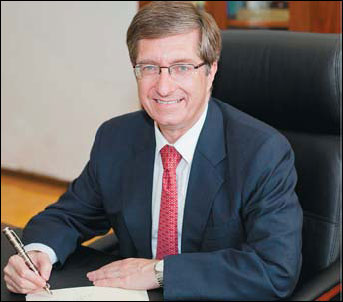Legal eagle blazes trails for Chinese law students
Updated: 2013-01-31 07:43
By Wang Hongyi in Shanghai (China Daily)
|
||||||||
|
Jeffrey Lehman hopes to bring innovation to China's education system. Provided to China Daily |
My China Dream | Jeffrey Lehman
For the American scholar and lawyer Jeffrey Lehman, one of his most memorable experiences in China was celebrating the graduation of the first class of Peking University School of Transnational Law in June.
A former president of Cornell University and dean of the University of Michigan Law School, in 2008 Lehman became the chancellor and founding dean of STL, located on the university's Shenzhen campus in Guangdong province.
That was the start of his journey to bring innovation to China's education system. STL duplicates the experience of US law schools, with its graduates eligible to sit for the New York bar exam.
"The school began with the best elements of American legal education, and then improved them in the Chinese context," says Lehman. "I am deeply honored to have been part of the team that launched the school, and I will always care deeply about it."
In Lehman's eyes, STL in China has already transformed the world of legal education. "Globalization has transformed China's economy and it has also transformed the kind of training that lawyers need if they are to properly serve Chinese clients," Lehman says.
"Chinese companies are listing their stocks in London, Chinese investors are participating in arbitrations in Singapore, and the Chinese government is resolving disputes before the WTO. They all need lawyers who have been trained to be successful in those environments."
After developing STL, Lehman continued his China journey by joining Shanghai New York University as its vice chancellor and CEO of the school's startup joint venture in April 2012.
NYU Shanghai is the first institution of higher education jointly established by China and the United States.
It features a fusion of US and China's higher education styles, placing students in a cross-cultural environment for their four-year studies.
"Nowadays important innovations regularly happen because people raised in different cultures are able to combine their perspectives and develop breakthrough new ideas," Lehman says.
"By studying side by side with students from different backgrounds, our students will learn to see the world through the eyes of others."
The first students of NYU Shanghai, half of them Chinese and half international, will arrive this fall.
They will receive a "liberal education" in English, following a style of teaching that pushes them and their classmates to develop their creativity and critical-thinking skills. And they will spend as many as three semesters studying outside China, on other campuses within NYU's extensive global network.
The education method and concept are believed by many domestic experts to stimulate the country's less innovative higher education.
"The new Sino-foreign higher education mode will help improve the level of Chinese universities' education and the quality of scientific work," says Huang Jianru, a higher education expert from Xiamen University in Fujian province. "The partnership will make Chinese universities become more internationalized."
Lehman says, "Now China's leaders have turned their attention to teaching methods. Twenty-first century pedagogy - the kind that develops students' creativity and critical thinking skills - requires more resources than rote memorization, and China has now developed its economy to a level where those resources are available."
When talking about his expectation of graduates of NYU Shanghai in four years, Lehman is confident.
"Whatever their individual specialties may be, they will share a well-developed capacity for innovation, and a readiness to be effective on the global stage."
For his contributions, Lehman received the 2011 Friendship Award, China's highest award for foreign experts who have made outstanding contributions to the country's economic and social progress.
He is also one of the 20 foreign experts who were invited by China's top political leader Xi Jinping for a round-table discussion on Dec 5.
wanghongyi@chinadaily.com.cn
(China Daily 01/31/2013 page18)

 In Photos: 7.0-magnitude quake hits Sichuan
In Photos: 7.0-magnitude quake hits Sichuan
 Li Na on Time cover, makes influential 100 list
Li Na on Time cover, makes influential 100 list
 FBI releases photos of 2 Boston bombings suspects
FBI releases photos of 2 Boston bombings suspects
 World's wackiest hairstyles
World's wackiest hairstyles
 Sandstorms strike Northwest China
Sandstorms strike Northwest China
 Never-seen photos of Madonna on display
Never-seen photos of Madonna on display
 H7N9 outbreak linked to waterfowl migration
H7N9 outbreak linked to waterfowl migration
 Dozens feared dead in Texas plant blast
Dozens feared dead in Texas plant blast
Most Viewed
Editor's Picks

|

|

|

|

|

|
Today's Top News
Live report: 7.0-magnitude quake hits Sichuan, heavy casualties feared
Boston suspect cornered on boat
Cross-talk artist helps to spread the word
'Green' awareness levels drop in Beijing
Palace Museum spruces up
First couple on Time's list of most influential
H7N9 flu transmission studied
Trading channels 'need to broaden'
US Weekly

|

|








